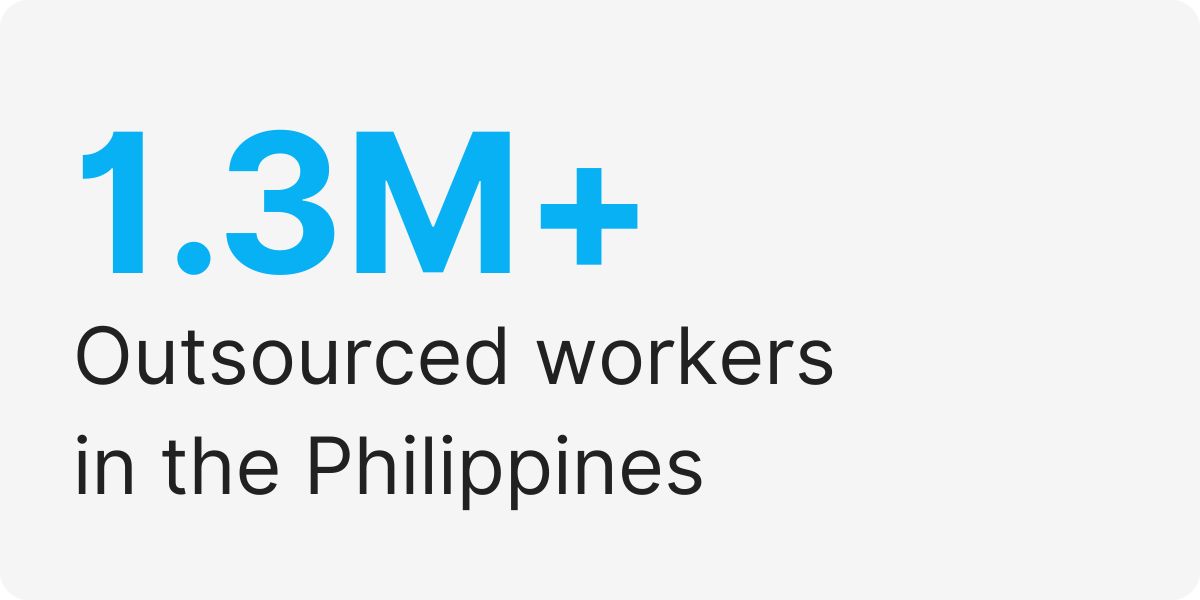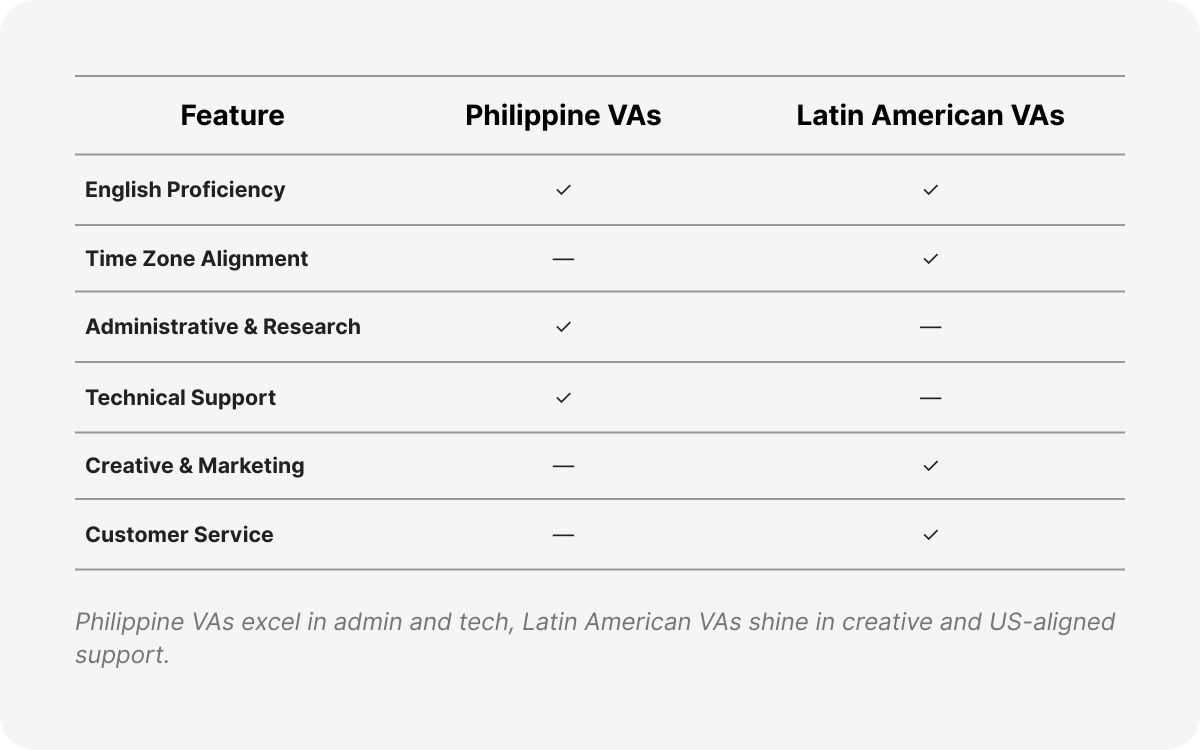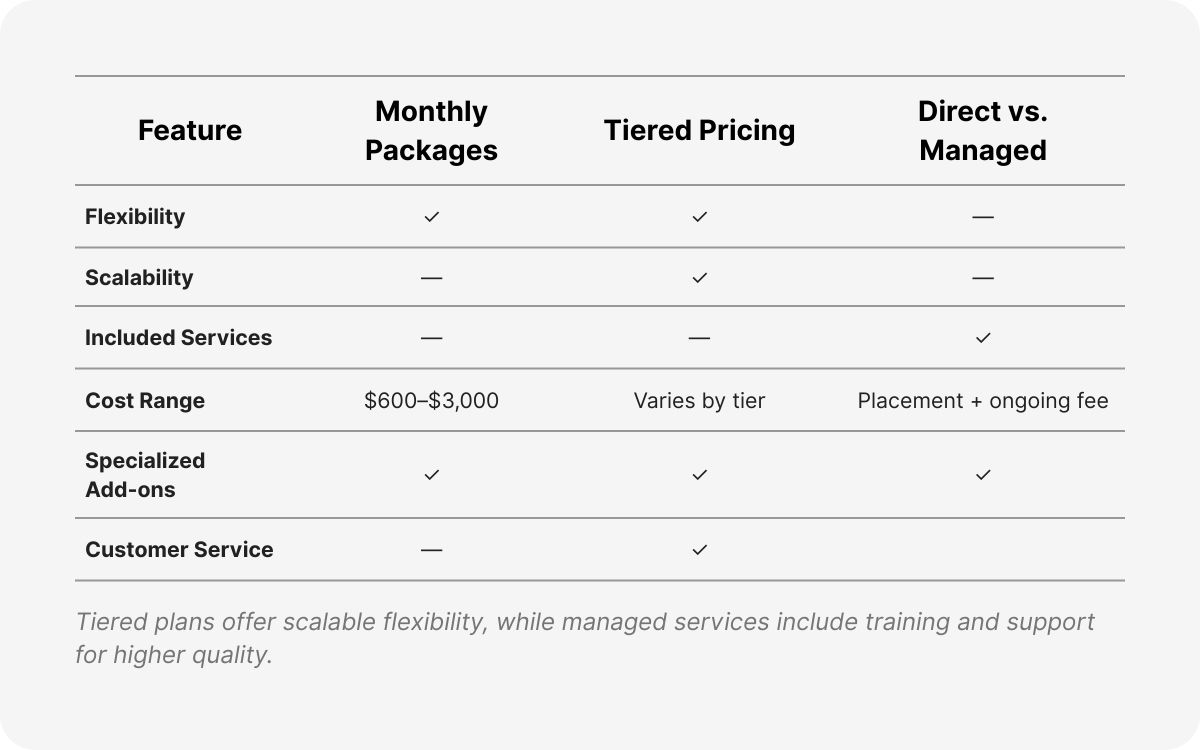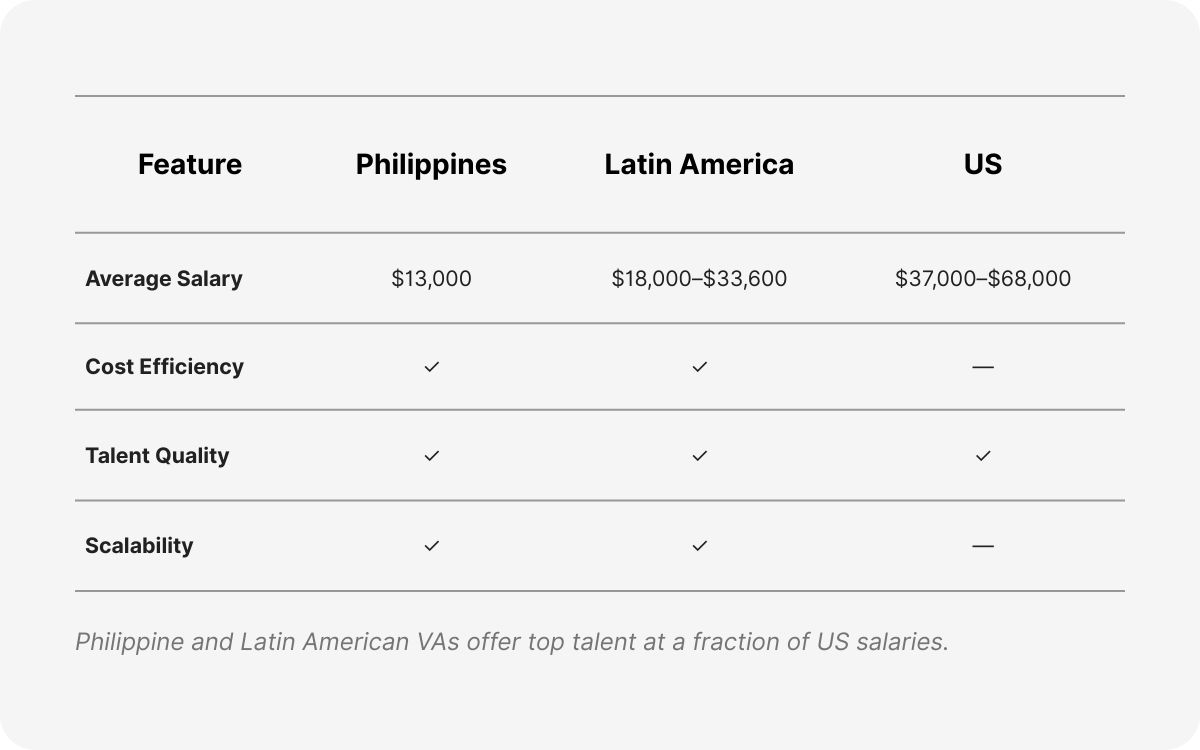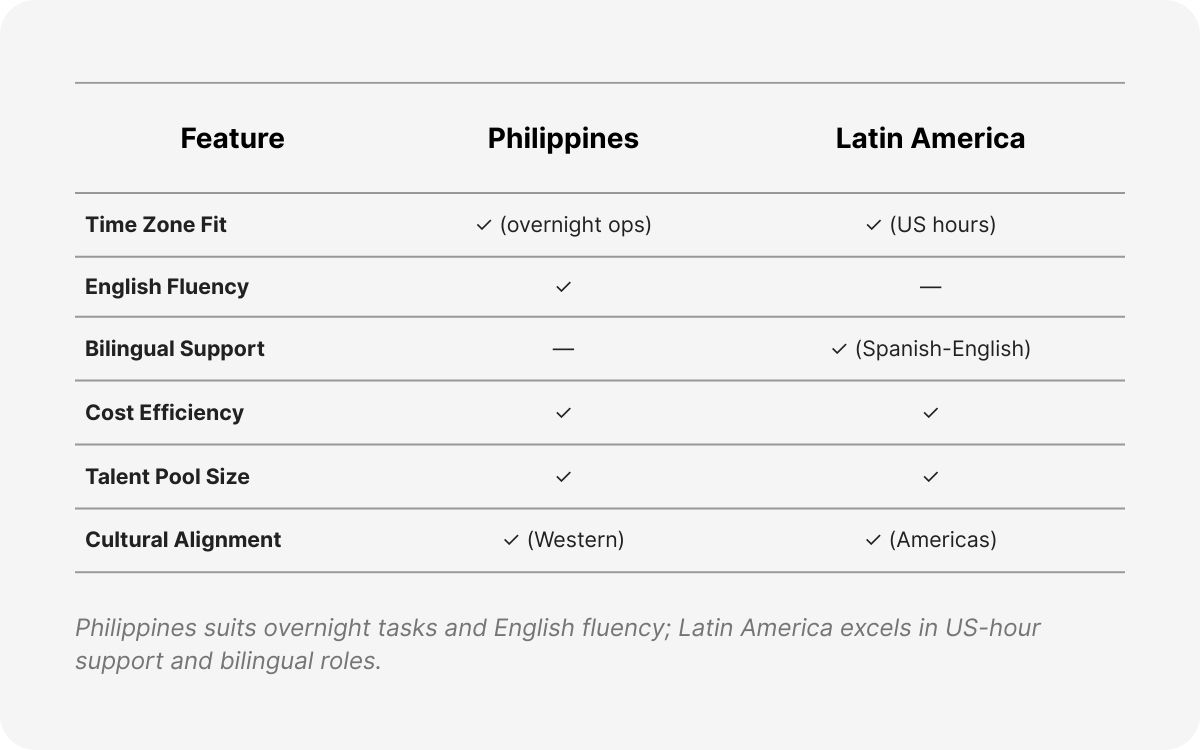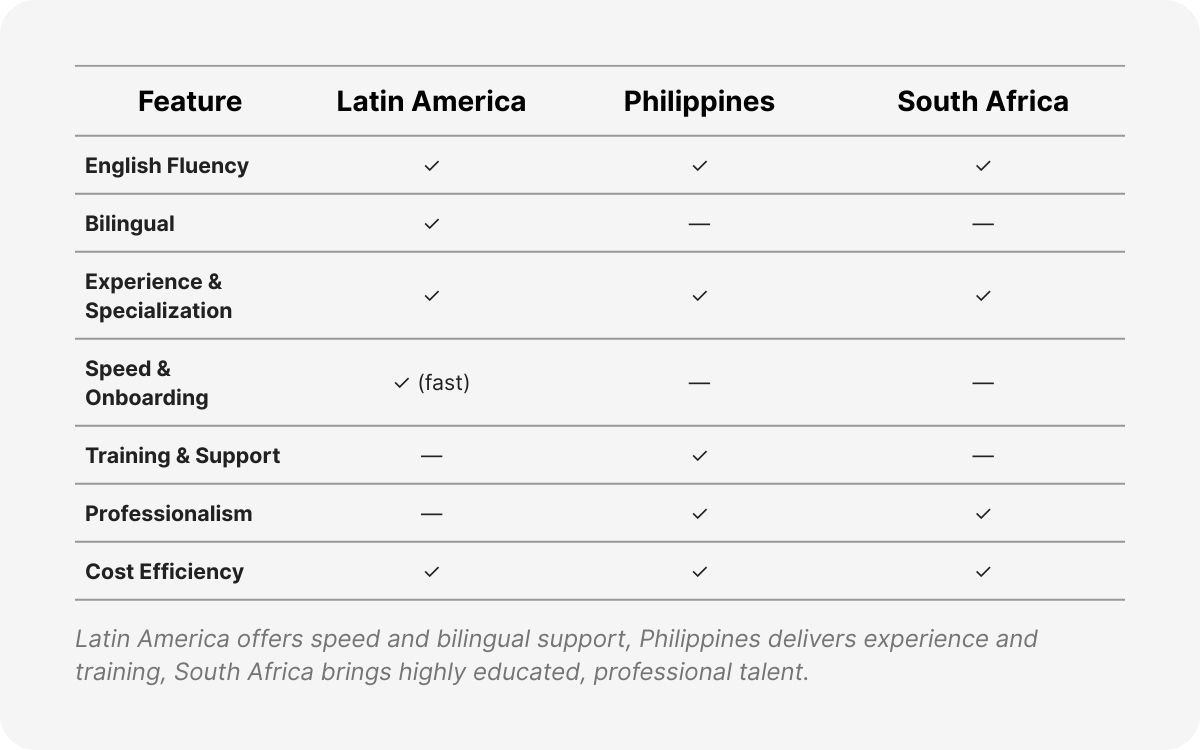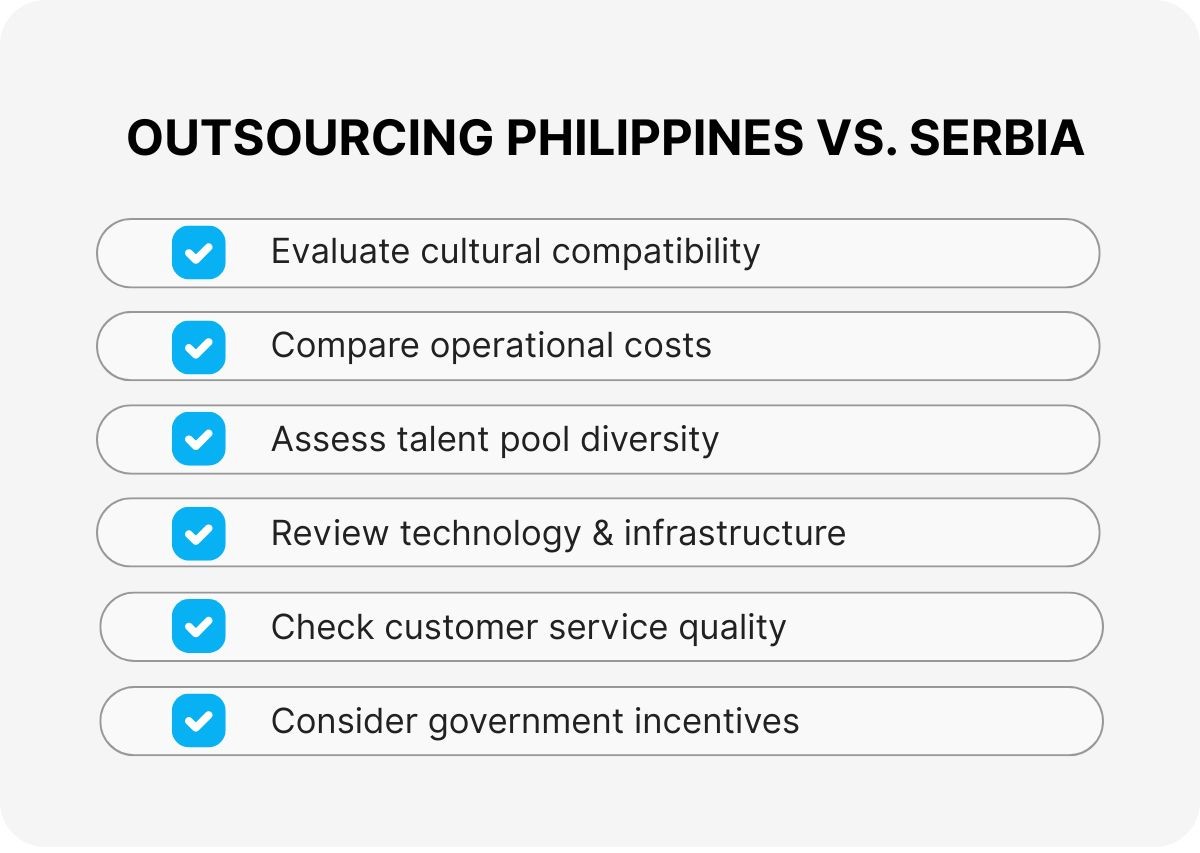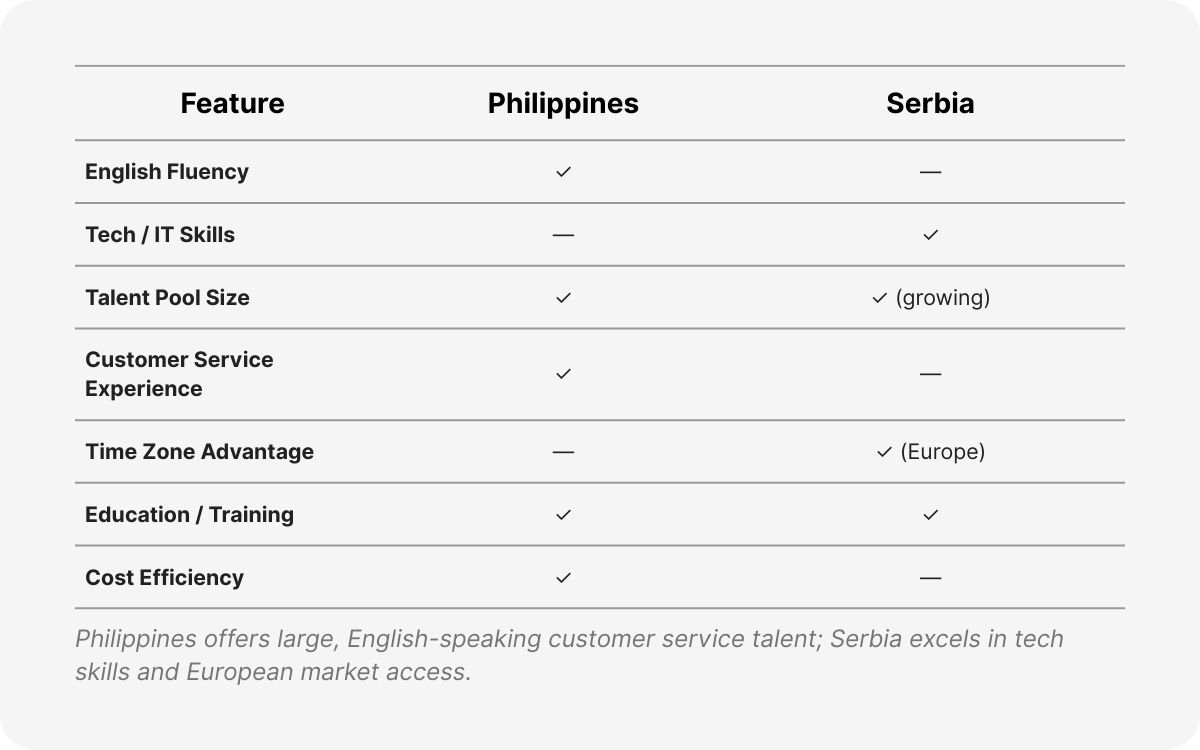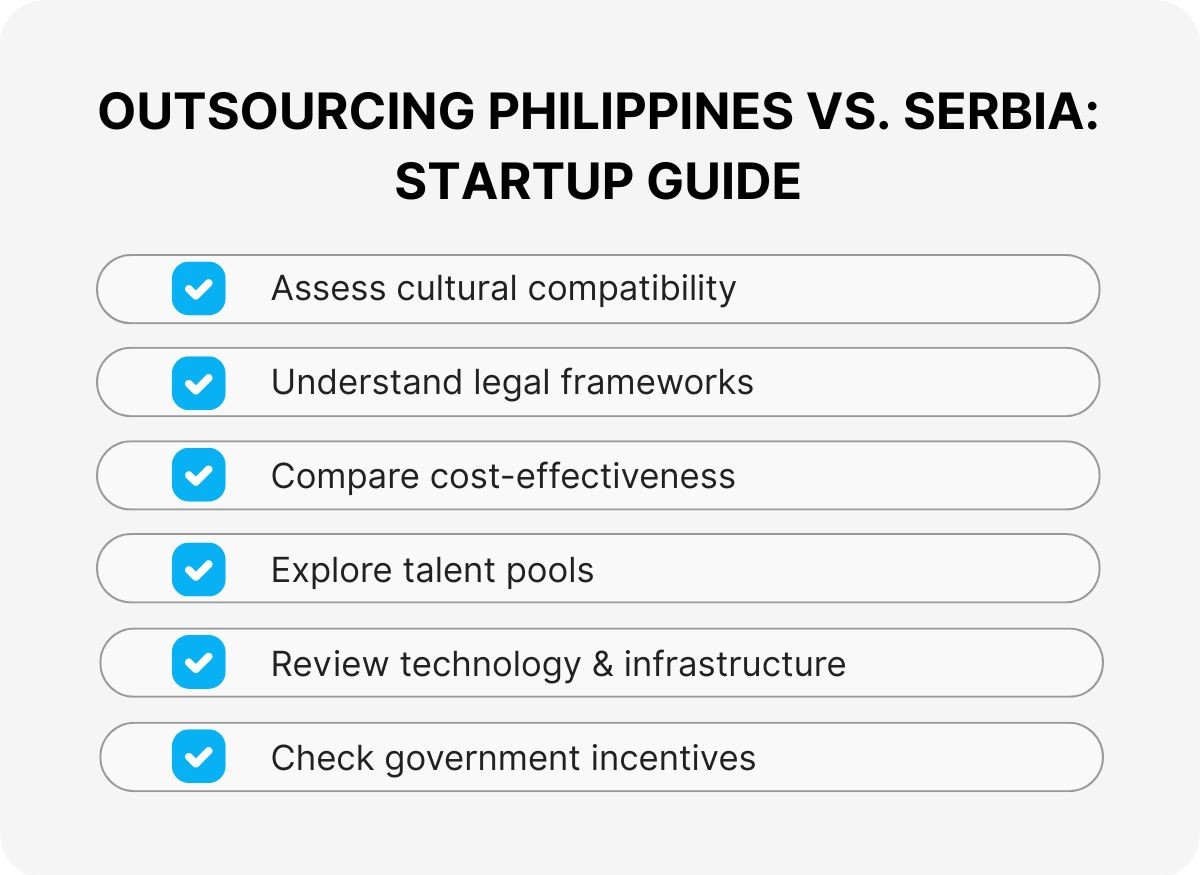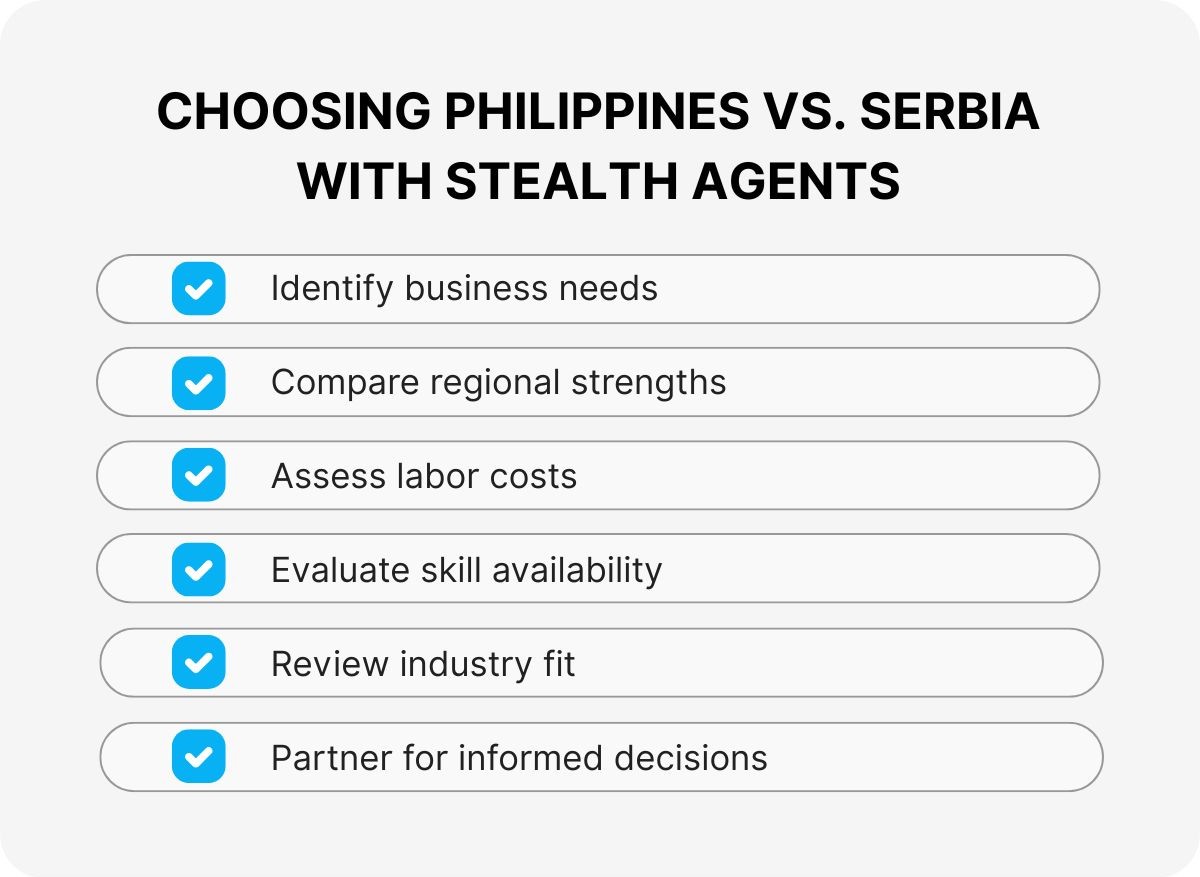Outsourcing to the Philippines or Serbia can help your business cut costs and scale faster with skilled remote talent. Stealth Agents makes this easy by matching you with top virtual assistants based on your goals, so you save time, reduce overhead, and get results without the hassle.
The Philippines is home to over 1.3 million outsourced workers, showcasing its prominence in the global outsourcing market, while Serbia’s outsourcing industry is thriving with an annual growth rate of 20%.
For businesses aiming to optimize their operations, the choice between Outsourcing Philippines vs. Serbia becomes critical, offering a blend of cost-effectiveness and access to skilled labor.
Both destinations provide a rich talent pool, particularly in virtual assistant services, which can significantly enhance productivity.
Stealth Agents, a leader in this field, has successfully matched numerous businesses with the right talent, offering complimentary consultations to tailor virtual assistant pricing to your specific needs.
With their expertise, you can navigate the complexities of outsourcing, seamlessly ensuring your business benefits from the best solutions available.
As businesses strive for efficiency, understanding the nuances of each country’s offerings is critical to making informed decisions. Ultimately, exploring both options could catalyze your subsequent business success.
Comparing Key Strengths: Philippine vs. Latin American Virtual Assistants
When it comes to areas of specialization, virtual assistants from the Philippines and Latin America each bring distinct strengths to your remote team.
Philippine Virtual Assistants:
Renowned for their strong command of English, Filipino VAs shine in roles that demand meticulous attention to detail and clear communication. They’re frequently trusted with:
- Overnight operations and after-hours monitoring, thanks to their adaptability with time zones
- Technical support and troubleshooting for digital platforms
- Process-oriented tasks such as data management and workflow documentation
- In-depth research and administrative support
Latin American Virtual Assistants:
On the other hand, VAs from Latin America stand out for their bilingual capabilities (Spanish and English) and closer time zone alignment with North American businesses.
Typical specialties include:
- Real-time customer service, live chat, and inbound support during standard US business hours
- Creative roles—social media management, content creation, and digital marketing
- Outreach tasks such as sales follow-ups, lead generation, and prospecting
- Translation, localization, and market entry research for businesses expanding into Latin American markets
How Fast Can You Be Matched with a Virtual Assistant?
Speed matters when scaling your business. With Stealth Agents, you won’t be left waiting. After you kick off the hiring process, most businesses are matched with a highly qualified virtual assistant in as little as 3–4 business days—sometimes even faster.
This rapid turnaround ensures your team gets the support it needs without unnecessary delays, allowing you to maintain momentum and focus on what matters most: growing your business through outsourcing to Philippines.
Comparing Virtual Assistant Pricing Structures
When it comes to pricing, virtual assistant providers offer a broad spectrum of plans to suit businesses of all shapes and sizes.
Whether you’re a startup eyeing part-time support or a scaling enterprise in need of full-time assistance, understanding how these fee models stack up can help you make a cost-effective choice.
Flexible Plans to Match Your Needs
- Monthly Packages: Most leading providers—whether based in the Philippines, Latin America, or elsewhere—offer monthly contracts that typically range from entry-level part-time support (around 40 hours/month) through to full-time availability. Price points often start near $600–$700/month for part-time help, rising to $1,500–$3,000/month for dedicated, full-time professionals. The actual figure depends on the assistant’s specialty, skills, and level of support required.
- Tiered Pricing: Many agencies use a tiered pricing approach, where you select from a few preset packages based on required hours or the nature of tasks. This lets you scale easily as your business grows—no need to sweat over rigid commitments.
- Direct Placement vs. Managed Services: Some firms offer a direct placement model (typically charging a placement fee and a lower ongoing wage), while others provide managed services—covering recruitment, training, and ongoing support—all rolled into a single monthly fee.
- Specialized Services and Add-ons: If your work calls for niche expertise (think web design, advanced marketing, or executive support), expect a premium. Some companies also tack on fees for additional services or more intensive onboarding and training, but these often translate to a higher quality match for your business.
Transparency and Customization
A notable plus in today’s market is transparent pricing; most reputable VA providers clearly outline hourly or monthly rates and are happy to fine-tune packages to your requirements. You’ll also find that many offer free initial consultations—think of it as a cheat code to tailor the perfect support solution without any surprises.
In a Nutshell
In summary, VA pricing is no longer one-size-fits-all. The right provider offers a balance between cost, flexibility, expertise, and hands-on support, so you find efficient help—without blowing your budget. With clear, customizable plans and a wide range of price points, you’re sure to uncover an option that checks every box for your business.
Comparing Virtual Assistant Salaries: Philippines, Latin America, and the US
One of the biggest draws of outsourcing to the Philippines or Latin America is the significant cost savings on salaries. The average annual salary for a virtual assistant in the Philippines, for instance, is around $13,000—a striking difference compared to what you’d find stateside.
Over in Latin America, virtual assistants typically earn between $18,000 and $33,600 per year. Both regions offer competitive rates that fall well below the typical US range of $37,000 to $68,000 for similar roles.
This cost advantage empowers businesses to allocate resources more efficiently and scale their teams without straining their budgets.
Outsourcing becomes not only accessible but also a strategic move for maximizing value and expanding your operations with top global talent.
With their expertise, you can navigate the complexities of outsourcing, seamlessly ensuring your business benefits from the best solutions available.
Engagement Models & Service Offerings for Virtual Assistants
When considering virtual assistant hiring, businesses benefit from a variety of engagement models and specialized service offerings, allowing for a close match to their unique needs.
Popular Engagement Models
- Staff Augmentation: Effortlessly scale your team by integrating remote professionals as needed for projects or ongoing support.
- Nearshore Teams: Collaborate with assistants in similar time zones—think hubs in Latin America like Peru, Mexico, and Brazil, as well as the Philippines—making communication smoother and project management more agile.
- Dedicated Full-Time or Part-Time VAs:Choose flexible arrangements, from part-time support for specific tasks to full-time partnerships for ongoing projects.
- Custom Placement: Some providers match you with carefully vetted talent, often after rigorous multi-stage assessments, ensuring only top-tier professionals join your workflow.
Core Service Offerings
- Administrative Support: Get help with managing emails, scheduling, travel, and back-office operations.
- IT & Web Services: Benefit from virtual assistants skilled in IT staff augmentation, custom software development, and web development, trusted by organizations like Mercedes-Benz and Major League Soccer.
- Marketing & Customer Service: Tap into support for e-commerce management, digital marketing, customer inquiries, and social media.
- Industry-Specific Services: From real estate and finance to startups and healthcare, virtual assistants often bring niche expertise tailored to your sector.
Vetting & Training
- Reputable providers often conduct detailed interviews, skill assessments, and immersive training. Whether it’s a four-week boot camp or stringent selection processes—often with acceptance rates below 1%—you gain peace of mind knowing your assistant has been thoroughly evaluated.
Recommended Virtual Assistant Companies in the Philippines and Latin America
If you’re searching for reputable virtual assistant providers in the Philippines and Latin America, there are a handful of standout companies known for connecting businesses with skilled remote professionals.
Top Picks for Your VA Needs
- VirtualStaff.ph
Based in the Philippines, VirtualStaff.ph is a popular online hiring platform. With a robust database of Filipino remote workers, it’s a go-to choice for companies—including major brands like Shopify and Etsy—seeking to simplify the hiring process. Whether you’re looking for a dedicated full-time assistant or want to build an entire team, their flexible billing models adapt to different business needs.
- Somewhere
Somewhere has carved out a niche by sourcing talent not just from the Philippines but also from Latin America and South Africa. Specializing in screening and vetting candidates, they serve a broad swath of industries, such as e-commerce, tech startups, and agencies. Their flat-fee pricing and large pool of pre-vetted professionals remove much of the traditional recruitment hassle.
- Virtual Latinos
For businesses prioritizing Latin America, Virtual Latinos offers a highly curated approach, matching you with vetted VAs skilled in everything from administration to marketing and sales. Their flexible hourly pricing and reputation for exceptional quality earned them a spot among the Inc. 5000’s fastest-growing companies.
- MyOutDesk
With over a decade of experience and thousands of clients around the globe, MyOutDesk is renowned for providing highly skilled virtual assistants out of the Philippines. Their offerings are ideal for companies that need support with sales, back office tasks, and customer service. Consistently recognized industry-wide, they’re a reliable choice for both short-term tasks and long-term team growth.
Why Choose These Providers?
These companies are trusted for their clear communication, strong vetting processes, and tailored approaches to connecting you with remote talent who seamlessly integrate into your workflow.
Whether you favor Filipino VAs for their Western cultural affinity or seek LatAm professionals for timezone compatibility, these platforms offer robust solutions to help you find the perfect fit.
By working with established providers, you minimize the risk of mismatches and gain the support needed to scale your team smoothly—leaving you to focus on growing your business.
As businesses strive for efficiency, understanding the nuances of each country’s offerings is critical to making informed decisions. Ultimately, exploring both options could catalyze your subsequent business success.
What to Consider: Philippines vs Latin America for Virtual Assistants
When deciding between hiring virtual assistants from the Philippines or Latin America, it pays to consider your business’s unique needs and workflow preferences.
Key Factors to Weigh:
- Time Zone Compatibility:
The Philippines’ time zone is ideal if you need tasks tackled overnight, keeping your business humming around the clock. For teams seeking real-time collaboration during standard US hours, Latin American hires offer an undeniable advantage thanks to overlapping time zones.
- Language and Communication:
Filipino professionals are celebrated for their high English fluency and accent neutrality—perfect for North American clientele. Latin America adds another dimension with widespread bilingual (Spanish-English) talent, catering to businesses reaching out to diverse markets.
- Cost and Labor Pool:
Both regions are known for cost-effective talent, but the sheer scale of the workforce in the Philippines and the rapidly growing outsourcing sector in countries like Colombia and Mexico mean you’re spoilt for choice. Latin America, however, offers an edge in certain specialized roles, particularly for industries valuing bilingual support.
- Cultural Alignment:
The Philippines is heavily influenced by Western culture, often translating to fewer hurdles in aligning business practices. Latin America brings its own strengths, especially for businesses with a footprint or ambitions in the Americas.
Key Features and Strengths of Virtual Assistant Services from Latin America, the Philippines, and South Africa
When considering where to outsource your virtual assistant (VA) needs, understanding the unique strengths of providers from Latin America, the Philippines, and South Africa can help you find the talent that fits your business best.
Latin America: Speed, Bilingual Talent & Specialized Support
Latin American VAs stand out for their bilingual (often Spanish/English) capabilities and close time zone alignment with North American businesses. This makes real-time collaboration seamless, especially for US-based teams. Many providers in this region offer rapid hiring—some matching you with skilled VAs in under a week.
Latin America is also known for rigorous vetting processes, with only top-tier candidates advancing thanks to multi-stage interviews and skills assessments.
Whether you need IT staff augmentation, custom software development, or assistance with daily business operations, you’ll find diverse expertise and flexible engagement models here.
Notable strengths:
- Fast onboarding and flexible staffing options
- Strong English proficiency, with many VAs also fluent in Spanish or Portuguese
- Tailored support across industries, including tech, marketing, finance, and customer service
- High standards for talent selection and vetting
The Philippines: Depth of Experience & English Fluency
The Philippines is a global leader in the VA space, with a large, readily available pool of experienced professionals. Filipino VAs are highly regarded for their strong work ethic, exceptional English fluency, and familiarity with Western business practices.
Agencies in the Philippines often provide comprehensive training and support, creating a collaborative environment where your VA can become a seamless extension of your team.
Whether you’re looking for help with e-commerce, real estate, executive assistance, or digital marketing, you’ll find that Filipino VAs deliver with reliability and excellence.
Notable strengths:
- Extensive experience handling administrative and specialized tasks
- Exceptional communication and cultural compatibility with Western clients
- Flexible pricing with full-time and part-time options available
- Holistic support and training, ensuring consistent, high-quality service
South Africa: Emerging Talent & Academic Backing
South Africa’s VA market is growing rapidly, bolstered by a highly educated workforce and strong English proficiency. Some providers collaborate closely with leading universities to identify candidates with excellent attention to detail, critical thinking, and communication skills.
South African VAs bring a unique blend of professionalism and innovation, making them well suited for roles in executive support, project management, and customer relations. The thorough vetting processes in South Africa ensure you get driven individuals equipped to handle complex tasks with efficiency.
Notable strengths:
- Highly educated candidates, often with advanced degrees
- Diverse expertise spanning industries such as healthcare, law, startups, and finance
- Proactive problem-solving and growth mindset among candidates
- Competitive pricing for managed and direct hire solutions
Outsourcing Philippines vs. Serbia: Advantages?
1. Cultural Affinity and Adaptability
Outsourcing to the Philippines vs. Serbia highlights the importance of cultural affinity and adaptability in cross-border business operations.
The Philippines offers significant advantages due to its Western cultural ties and exceptional English proficiency, which are crucial for smooth communication and aligning business practices.
While possessing a skilled workforce, Serbia primarily focuses on Eastern European languages, which might require additional adjustments for English-speaking clients.
The Philippines’ ability to bridge cultural gaps effectively positions it as a preferred outsourcing destination for companies aiming for seamless integration and collaboration.
2. Cost-Efficiency in Operations
When evaluating Outsourcing in the Philippines versus Serbia, cost efficiency is critical to decision-making.
The Philippines is renowned for its lower labor costs, offering businesses substantial savings, especially in customer service and IT sectors.
Although Serbia provides competitive pricing compared to Western countries, the Philippines’ economic efficiency is enhanced by favorable governmental policies and incentives that create a conducive business environment.
The financial benefits of choosing the Philippines ensure an attractive option for companies seeking to maximize their budget without compromising quality and service delivery.
3. Diverse Talent Pool
Outsourcing to the Philippines vs. Serbia highlights the importance of tapping into a diverse talent pool to address various business needs.
With its extensive workforce of over 50 million professionals, the Philippines excels in healthcare, technology, and customer service, offering businesses a broad spectrum of specialized skills.
While Serbia is strong in IT and engineering, its smaller population might restrict the range of expertise available.
The Philippines’ healthcare outsourcing provides companies with various options to meet their specific outsourcing needs, ensuring they can find the perfect match for their projects.
4. Technological Advancements and Infrastructure
The comparison of Outsourcing Philippines vs. Serbia emphasizes the crucial role of technological advancements and infrastructure in achieving successful outsourcing partnerships.
The Philippines has significantly advanced its technological landscape, providing modern facilities and dependable digital solutions bolstered by supportive government initiatives.
While Serbia is noted for its strong IT sector, the Philippines’ holistic approach to technology across multiple industries offers a persuasive option for businesses needing advanced technological support.
The country’s dedication to technological development, particularly in the Philippines’ IT outsourcing, ensures that companies can depend on efficient, state-of-the-art infrastructure.
5. Excellence in Customer Service
Evaluating Outsourcing Philippines vs. Serbia reveals the Philippines’ global reputation for excellence in customer service.
Known for the warmth and hospitality of its people, the Philippines excels in delivering empathetic and effective customer interactions, making it a top choice for businesses prioritizing exceptional customer experiences.
Since 2010, Filipino call centers have led the industry, underscoring their proficiency in meeting diverse customer needs.
While Serbia emphasizes quality support, the Philippines’ renowned service standards and cultural emphasis on hospitality make it the preferred destination for companies aiming to enhance customer satisfaction and engagement.
Outsourcing Philippines vs. Serbia: Talent Availability?
When considering Outsourcing Philippines vs. Serbia, several advantages emerge for businesses seeking to optimize their operations through cost-effective solutions.
Known for its large English-speaking workforce, the Philippines has a cultural affinity with Western countries, facilitating seamless communication and business processes.
Additionally, the Philippines’ competitive labor costs make it an attractive destination for businesses seeking cost savings without compromising quality.
- The Philippines offers a strong background in customer service and extensive experience in the BPO industry.
- A large talent pool of virtual assistants in the Philippines ensures businesses can access necessary support for various functions.
Conversely, Serbia boasts a rapidly growing pool of tech-savvy professionals, making it a prime location for IT and software development outsourcing.
Serbia’s strategic position in Europe allows businesses to benefit from favorable time zones and ease of access to the European market.
- Serbia excels in providing technical skills, particularly in engineering and software development, which are increasingly in demand.
- A robust educational system in Serbia contributes to a steady influx of highly qualified and motivated professionals ready to tackle complex projects.
Ultimately, the decision between these two outsourcing destinations depends on the business’s specific needs and strategic goals, ensuring the right fit for different operational requirements.
Outsourcing Philippines vs. Serbia: A Quick Startup Guide?
-
Understanding Cultural Compatibility
Cultural compatibility is critical when analyzing Outsourcing Philippines vs. Serbia. a. Quick options for a successful startup.
The Philippines has a strong cultural affinity with Western countries, influenced by its history, which makes collaboration seamless and efficient in many cases.
This alignment is beneficial in industries like customer service, where understanding cultural nuances is paramount.
In contrast, Serbia’s cultural ties with Europe allow for excellent collaboration with European companies, offering a strategic advantage in that region.
Both countries provide cultural training programs to facilitate better integration and understanding between international teams.
Despite their differences, the Philippines and Serbia emphasize the importance of cultural adaptability in their workforce, ensuring smoother interactions.
Successfully navigating these cultural landscapes can make the outsourcing transition more efficient and productive for businesses.
-
Navigating Legal and Regulatory Frameworks
The legal and regulatory frameworks in the Philippines and Serbia are designed to support foreign investments, but they differ in certain aspects that businesses must consider.
The Philippines is known for its Business Process Outsourcing (BPO) sector, which benefits from government support and incentives, creating a favorable environment for startups.
With over 1.3 million Filipinos employed in the BPO industry, it represents a significant contributor to the national economy.
Conversely, Serbia offers attractive tax incentives for IT and tech companies, making it a compelling choice for technology-driven businesses.
Both countries provide robust legal support to protect intellectual property and data security.
Understanding these regulations is crucial to establishing a compliant and successful outsourcing operation in either location.
While the legal landscape may vary, both nations prioritize creating a business-friendly environment for international investors.
-
Evaluating Cost-Effectiveness
When evaluating Outsourcing Philippines vs. Serbia Quick Solutions, cost-effectiveness is crucial for businesses looking to cut operational expenses.
The Philippines is renowned for its competitive labor costs, drawing numerous multinational companies searching for budget-friendly solutions.
With a skilled and cost-effective workforce, the Philippines is a favored destination for outsourcing tasks like virtual assistants for customer service and administrative roles.
Serbia, meanwhile, offers competitive pricing, especially in the tech sector, where skilled professionals are available at reasonable rates.
Both countries deliver high-quality services at a fraction of the cost compared to Western markets, appealing to cost-conscious companies.
Despite variations in pricing structures, both locations focus on providing value through skilled labor and efficient processes.
Selecting the right destination requires assessing each country’s specific cost advantages for the desired services.
-
Accessing Talent Pools
Exploring Outsourcing Philippines vs. Serbia, Quick opportunities reveal a strategic advantage in accessing diverse talent pools for business growth.
The Philippines is renowned for its vast pool of English-speaking professionals, particularly excelling in customer service and healthcare industries.
This linguistic proficiency is bolstered by a high literacy rate and a robust educational system, facilitating the recruitment of qualified candidates.
Conversely, Serbia is home to a growing number of tech-savvy professionals, especially in software development, engineering, and outsourced IT support.
Serbian workers are celebrated for their problem-solving skills and technical expertise, making them attractive to businesses focused on the IT and technology sectors.
Both countries provide specialized training programs to enhance workforce skills, ensuring talent readiness for international projects.
Despite differences in industry strengths, the Philippines and Serbia offer access to skilled professionals capable of meeting diverse business needs.
-
Leveraging Infrastructure and Technology
Infrastructure and technology are pivotal in the decision-making process when considering Outsourcing Philippines vs. Serbia. Quick options for efficient business operations.
The Philippines has developed a robust infrastructure to support its thriving BPO industry, with reliable internet connectivity and state-of-the-art facilities.
This includes technology parks and business centers designed to cater to the needs of outsourcing clients, ensuring operational efficiency.
Serbia is rapidly advancing in technological infrastructure, with significant digital transformation and connectivity investments.
The country’s focus on tech innovation makes it an appealing choice for startups needing cutting-edge technology solutions.
Both nations prioritize continuously improving their infrastructure to meet global standards and attract international business.
Despite different levels of development, the Philippines and Serbia offer solid technological foundations to support successful outsourcing engagements.
How Can Stealth Agents Help Choose Between Outsourcing to the Philippines vs. Serbia?
Stealth Agents offers invaluable expertise to businesses deciding between Outsourcing Philippines vs. Serbia, providing guidance tailored to your needs.
The Philippines excels with its vast English-speaking workforce, which is perfect for customer service and healthcare roles.
The competitive labor costs make it an attractive choice for budget-conscious companies.
Conversely, Serbia is known for its skilled tech professionals, particularly in software development and engineering.
The country’s solid educational system supports a growing pool of experts in technical fields.
Stealth Agents assesses your unique requirements, helping you understand these regional strengths to make a well-informed outsourcing decision.
Evaluating the cost-effectiveness and skill availability in both countries ensures your business receives maximum value from its outsourcing strategy.
Partnering with Stealth Agents provides clarity and confidence in selecting the right outsourcing destination to meet your organizational goals.
Frequently Asked Questions
Frequently Asked Questions
What are the main language differences between outsourcing to Philippines vs Serbia?
The Philippines offers native-level English proficiency due to historical ties with the US, making communication seamless for American businesses. Serbia primarily uses Serbian and has strong English as a second language, but with potential accent differences. Filipino professionals typically require no language training, while Serbian workers may need additional English communication coaching for customer-facing roles.
How do internet infrastructure and connectivity compare between Philippines and Serbia for outsourcing?
Serbia generally offers more stable internet infrastructure with average speeds of 50+ Mbps and reliable fiber connections. The Philippines has improved significantly but can face occasional connectivity issues in some regions, averaging 25-35 Mbps. Both countries have backup power systems, but Serbia’s European infrastructure standards typically provide more consistent uptime for mission-critical operations.
Which country offers better data security and privacy compliance for outsourcing projects?
Serbia follows strict EU GDPR compliance standards, making it ideal for European clients requiring stringent data protection. The Philippines has its own Data Privacy Act but may require additional security certifications for EU/US clients. Serbian outsourcing providers typically offer built-in GDPR compliance, while Philippine providers may need custom security implementations depending on client requirements.
What are the typical contract terms and employment laws when outsourcing to Philippines vs Serbia?
The Philippines offers flexible contract arrangements with minimal bureaucracy, allowing monthly or project-based agreements. Serbia has more structured employment laws aligned with EU standards, requiring formal contracts and specific termination procedures. Philippine outsourcing typically involves simpler onboarding, while Serbian partnerships may require more legal documentation but offer stronger worker protection frameworks.
How do holiday schedules and working calendars differ between Philippines and Serbia outsourcing?
The Philippines follows a mix of Christian holidays and local festivals, with Christmas season extending longer than Western countries. Serbia observes Orthodox Christian holidays and European vacation periods, including August breaks. Philippine workers often work during US holidays, while Serbian professionals may take extended summer vacations, requiring businesses to plan coverage differently.
Which industries have the strongest outsourcing presence in Philippines vs Serbia?
The Philippines dominates in customer service, healthcare support, finance, and general virtual assistance with over 1.3 million BPO workers. Serbia excels in software development, game development, engineering, and technical support with growing fintech expertise. Philippine providers offer broader service diversity, while Serbian outsourcing focuses on high-skill technical and creative industries.
What are the typical minimum team sizes and scalability options in Philippines vs Serbia?
The Philippines offers extreme scalability from single virtual assistants to teams of 1000+ with rapid hiring capabilities. Serbia typically focuses on smaller, specialized teams of 5-50 professionals with emphasis on quality over quantity. Philippine providers can scale teams within weeks, while Serbian scaling takes longer but offers more specialized skill matching and team cohesion.
How do management styles and business culture differ between Philippines and Serbia outsourcing?
Filipino business culture emphasizes hierarchy, respect, and indirect communication, requiring clear instructions and positive feedback. Serbian culture is more direct and egalitarian, with professionals comfortable challenging ideas and providing input. Philippine teams prefer structured management, while Serbian teams often work more independently and expect collaborative decision-making approaches.
What backup and disaster recovery options exist for outsourcing in Philippines vs Serbia?
The Philippines faces typhoon seasons and power grid challenges, requiring robust backup facilities and generators. Serbia has more stable infrastructure but potential political/regional considerations. Philippine outsourcing providers typically offer multiple site redundancies, while Serbian providers focus on technical backup systems. Both regions now offer cloud-based continuity, but geographic risk profiles differ significantly.
Which country offers better long-term partnership stability for outsourcing relationships?
The Philippines offers exceptional staff loyalty with average tenure of 3-5 years in outsourcing roles and lower turnover rates. Serbia has higher job mobility with professionals often moving between projects, averaging 1-3 years per engagement. Philippine partnerships tend toward long-term relationships, while Serbian collaborations often focus on project-based or shorter-term technical engagements with potential for rotation.
Takeaways
Choosing between the Philippines and Serbia for outsourcing is a decision that hinges on specific business needs and objectives.
The debate on Outsourcing between the Philippines and Serbia presents a fascinating comparison of two unique outsourcing destinations, each offering distinct advantages.
The Philippines stands out with its vast talent pool and exceptional English proficiency, making it an ideal choice for businesses prioritizing communication and cultural alignment.
Conversely, Serbia offers a strong foundation in IT and engineering, attracting companies seeking specialized technical expertise.
Both countries have made strides in technological advancements, yet the Philippines’ comprehensive infrastructure often appeals to businesses seeking diverse industry support.
When evaluating these two options, decision-makers must consider factors such as labor costs, skill availability, and industry focus.
Weighing these elements carefully will ensure that companies make informed decisions that align with their strategic goals.
Choosing between the Philippines and Serbia for outsourcing can help your business grow. Stealth Agents makes it easy to find the right virtual assistant for your needs. Schedule your consultation to get started.


